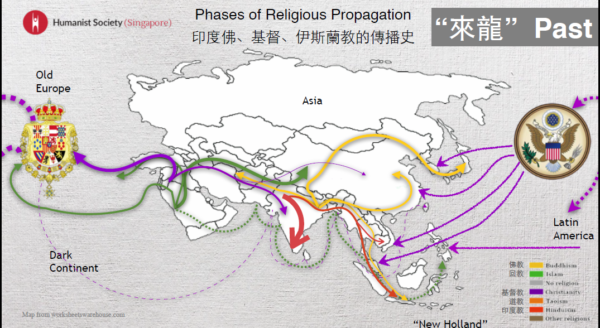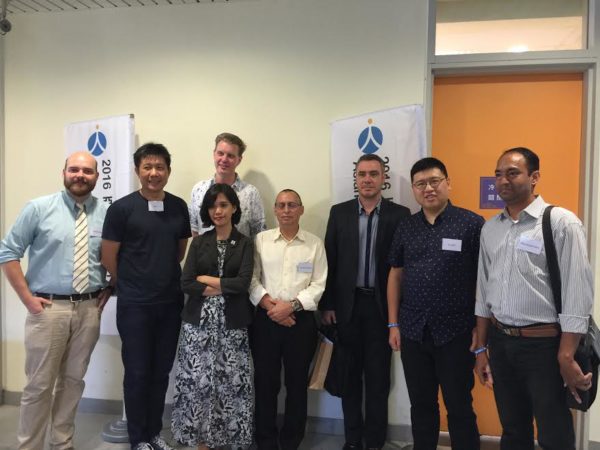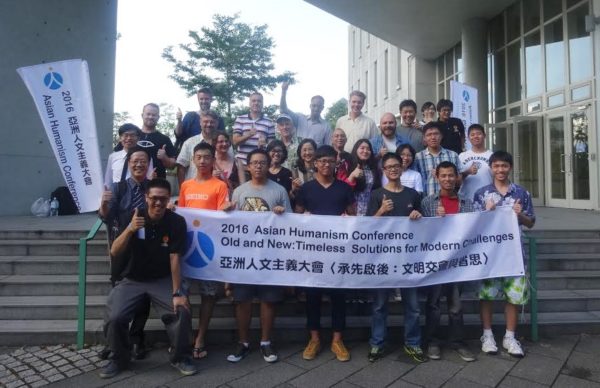This is a summary of our President Tan Tatt Si’s presentation at the International Humanist and Ethical Youth Organization (IHEYO) Asian Humanism Conference, held at National Taiwan University in Taiwan on August 6-7, 2016. The two-day conference, sponsored by IHEYO and hosted by Taiwanese humanists, also included speakers from various parts of Asia. Tatt Si was the first speaker.
Tatt Si’s presentation is titled “Religious Past, Humanism Future.” He started off by introducing the Humanist Society (Singapore), the multiracial nature of Singaporean society, the HumanistSG exco, and some of the activities we organized. This includes Darwin Day, the Asian Humanism Conference 2015 and our annual Pink Dot Picnic. Tatt Si explained that organizing certain events in Singapore can be challenging because of the need to account for religious sensitivities.
Tatt Si followed with a brief religious history of Asia. He flashed a map of Asia and showed where the major religions, such as Hinduism, Islam and Buddhism, spread throughout the continent. In the Middle Ages, Islam’s control of the Middle East and key trading routes blocked Christianity’s spread to the East. Christianity, however, spread westwards to the New World and converted the Americas. Catholicism then passed through the Pacific via Spanish voyages and reached the Philippines. He also touched on how various other religions gained their footholds in Southeast Asia.
Tatt Si then introduced modern Singapore and the formation of the Straits Settlements in 1824. He showed pictures showing Singapore’s transformation from a colonial port to a clean and green metropolis. He then talked about Taiwan’s history, the long presence of Taiwanese aboriginals and the beginning of modern history in the 1600s when colonial powers established a presence on the island. A brief Ming loyalist occupation followed, followed by conquest by the Qing dynasty in 1683, and finally the Japanese occupation from 1895 to 1945 which ended with Republic of China (ROC) control lasting till today.
Tatt Si then returned to the topic of Singapore, and showed some demographic figures pertaining to religious affiliation. He pointed to the fact that nearly 100% of Malays follow the Islamic faith. The fastest growth came from the Christian community. Finally, he introduced the non-religious community which comprise 18.5% of the Singapore resident population.
On why people took up Christianity in Singapore, Tatt Si explained that Singapore’s colonial past facilitated the growth of the religion. Many people took up Christianity to facilitate English proficiency, increased interaction and business opportunities with the ruling British. There is an internalized inferiority complex in Singapore, where people would take up a western religion such as Christianity, western language such as English, to improve their job prospects. It got to a point where people would assume that a good Mandarin speaker would be poor in English.
Tatt Si said if we understand the past well, we can use our knowledge to chart the future. After making that point, Tatt Si went on to talk about the spread of secular humanism across Asia, using the same map of Asia that he flashed in the beginning of the presentation. Tatt showed how the modern humanist movement arose from the Europe as people began to experience dissatisfaction with Christianity. At the same time, communism began to spread rapidly through Russia, Eastern Europe and China.
However, communism suppressed religion in a forceful manner and as a result, religion bounced back after communism faded, he said. Humanism, on the other hand, emerged “from within” through efforts at self-improvement. This is because people from various religious traditions have questioned their beliefs and emerged as humanists.
Photo: Tatt Si (left), chatting with Taiwanese participants at the conference.
Tatt Si hopes that as people switch religions, they will be exposed to a wide variety of religions and eventually stumble upon reason. This in turn would help make crossovers to religions harder, and subsequently increase their chances of becoming non-religious and humanist. However, a lot self-rationalizations will accompany these conversions, causing many people to hold on steadfastly to their faith of choice.
Tatt Si went to quote Ayaan Hirsi Ali: “Some things must be said, and there are times when silence becomes an accomplice to injustice.” Tatt Si said this should be the attitude humanists hold when we talk to people. “We don’t have to repel people, but this should be the attitude that when things are not right, when someone is a little too preachy, we can be preachy ourselves. It’s fair game,” he said.
Tatt Si talked about trends happening in as humanist campaigns take effect. This includes countries imposing taxes on churches (Norway, Germany), increasing resistance to Sharia law, and more discourses between the religious and non-religious. In addition, there are increasing numbers of non-religious people worldwide.
However, Tatt Si pointed to problems such as slow membership growth at many humanist and atheist organizations. What should humanist and atheist groups do? Tatt Si said humanists must engage the youth, organize “high-brow” talks (such as Singapore’s Darwin Day), have more discussion and debates over “wedge issues”, and creating sanctuaries for faith-leavers. There’s also a need to find allies and this should include women rights groups, said Tatt Si, adding that women often select the religion that will guide their families. By educating more women about humanism, they will pass these ideas to their children. Tatt Si also advocated the use of lighthearted approaches such as parodies, jokes and illustrations.
Tatt Si concluded the talk by emphasizing that “our future is our hands.” He quoted “There is a single light of Science, and to brighten it anywhere is to brighten it everywhere”, by Issac Asimov in 1970.
The conference’s main sponsor is the International Humanists and Ethical Youth Organization(IHEYO), the youth branch of the International Humanist and Ethical Union (IHEU). IHEYO is an umbrella organization that creates links between young humanists throughout the world. The local hosts of the event are Taichung Atheists, Freethinkers, Humanists and Taiwan Humanism Studio, and Ming-Jing Educational Association, three local humanist organizations in Taiwan.
Photo: Tatt Si (2nd from left) with various speakers at the conference.
Photo: Speakers, participants and volunteers at the Asian Humanism Forum in Taiwan.








